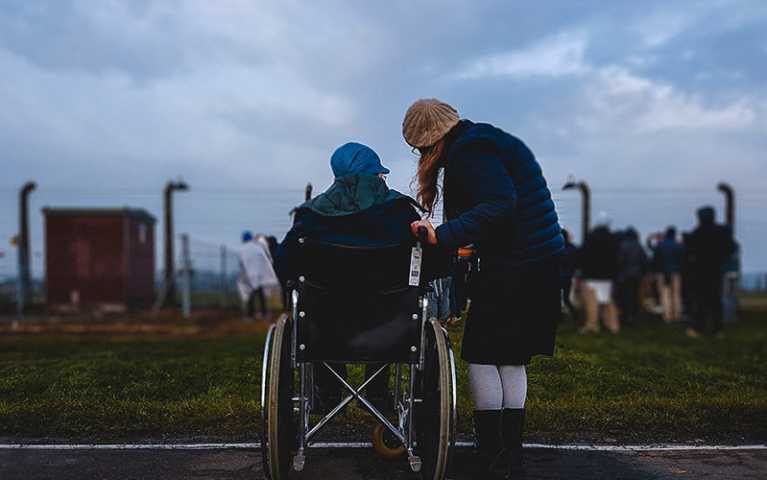If you're caught caring for kids and aging parents or grandparents, you're part of the Sandwich Generation. While it's incredibly rewarding to help your family members, make sure you also take care of yourself. Why the Sandwich Generation needs the best sleep possible.
Physician and mom of three Megan Mendez lives in a multi-generational household in Pennsylvania, where she's balancing midnight feedings for a newborn with fall prevention and a variety of other caregiving tasks for her father, a retired physician with Parkinson's disease.
Interrupted sleep is one of the hallmarks of Sandwich Generation caregivers. With Pew Research Center data suggesting that one in eight Americans are raising children and supporting aging parents, that's a lot of exhausted adults not getting enough sleep.
Sandwich Generation caregivers might fill their days with scheduling infant day care and adult home care, transporting children and parents to well checks and health screenings, buying diapers and adult briefs, formula and Ensure. It's exhausting, especially if they also have to work.
There are only so many hours in the day, and sleep may suffer.
They're also losing sleep worrying about the next fall, flu or finances. With all of these complex responsibilities weighing on their minds and bodies, they can't afford the negative health effects of sleep deprivation, such as high blood pressure, decreased productivity or depression.
Teacher Sarah Kauffman, from Pennsylvania, exemplifies this trend as she juggles caring for her four-year-old and one-year-old sons, while also caring for her grandmother, who has terminal cancer. Between meal prep, nursing, grading papers and more, she gets little sleep.
Sara Bell, from California, described caregiving for her grandmother as exhausting — especially at night. Bell had to share a bed with her Nana, who had dementia and would not go to sleep by herself.
Her grandmother woke often during the night, wandering the halls in search of her children and her father. This restlessness is common for people living with Alzheimer's disease. Disturbances to the sleep-wake cycle are a prominent feature of the disease, as this study notes.
How Sandwich Generation parents/children can maximize the rest they do get:
Focus on mindfulness
When the house is finally quiet, avoid turning to medical sites for answers about new caregiving concerns. Let the dishes linger in the kitchen sink for a few minutes. Consider instead a mindfulness app designed to reduce stress, anxiety and depression through cognitive behavioral therapy techniques. Users can track thoughts, mood, health and goals, and see their progress — a much better coping mechanism than worrying about Dad's next ER visit or your teen's homework headaches.
Sleep whenever possible
New moms are often told to sleep when the baby sleeps. This advice also applies to those caring for loved ones with Alzheimer's, who may have their nights and days mixed up. Susan Donahue, another Pennsylvanian mom (and daughter) became an expert on power naps when balancing full-time work with caring for her mother with Alzheimer's, her dad, a newly adopted 11-month-old and preemie baby.
Invest in a monitor
Wandering at any hour of the day is a serious concern for dementia caregivers. The Alzheimer's Association estimates that six in 10 people with Alzheimer's will wander at some point in the disease process. If you've got teens or young adults living at home and coming in late from work or school, the revolving door could pose a great risk.
Consider a motion-sensitive monitoring device. Such devices, which are often paired with an app, can detect when a loved one has gotten out of bed and send an alert to your phone. Besides wandering, falls are a major concern for elder caregivers. It's the leading cause of fatal and non-fatal injuries for those ages 65 and up, per the National Council on Aging. Many of these devices can monitor these movements as well.
Sandwich Generation caregivers are meeting their children, parents and grandparents' needs all day and all night.
Without taking time to care for themselves, caregivers risk burning out. One powerful investment can be a mattress that helps ensure the downtime they do get is of high quality. Check out Sleep Number 360® smart beds which adjust and include smart sleep tracking technology called SleepIQ® .
Want even better sleep? Sleepers who routinely use their Sleep Number 360® smart bed features and SleepIQ® technology get almost 100 hours more proven quality sleep per year.*
Like diet and exercise, quality sleep has a profound impact on our physical, emotional and mental wellbeing. Because no two people sleep the same, Sleep Number 360® smart beds, with SleepIQ® technology, sense your movements and automatically adjust firmness, comfort and support to keep you both sleeping comfortably and provide proven quality sleep. Find your Sleep Number® setting for your best possible night's sleep, and if you own a Sleep Number® bed, log in to your InnerCircle℠ Rewards account to see your exclusive offers, refer friends and more.
*Based on internal analysis of sleep sessions assessing sleepers who use multiple features of Sleep Number® products. Claim based on sleepers achieving over 15 more minutes of restful sleep per sleep sessions.
